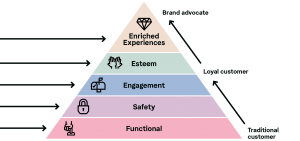- New research reveals the fragility of the shopper journey, with nearly four in ten UK shoppers abandoning a purchase at least once a week
- From engagement to enriched experiences, new report reveals Maslow-inspired shopper hierarchy of needs
- Shoppers increasingly want access to additional payment options that suit their situation and give them financial empowerment
- Retail expert Andrew Busby warns that current crisis has heightened importance of functionality and safety
Monday 6 July 2020: Four in ten UK shoppers (38%) abandon a purchase at least once a week, with a fifth (21%) claiming to do so more regularly. That’s according to new research by Klarna and BigCommerce, published today with a call for retailers to prioritise shoppers’ most fundamental needs for the sake of their bottom line as the UK heads towards a recession.
The research reveals a lack of fast and affordable delivery options as the number one reason behind cart abandonment, with over half of UK consumers (54%) admitting they have abandoned their online shopping cart due to delivery frustrations. The burden of needing to create an account and frustrations with the functionality of a mobile website came second, cited by 32% and 33% respectively as reasons to drop out.
Meanwhile, 27% of consumers have abandoned a purchase because they couldn’t remember their log in details for an existing account, whilst more than a quarter of UK shoppers (26%) admitted they have left a purchase halfway through because they ‘couldn’t be bothered’ to prepare their card details.
The findings, which highlight the fragility of the shopper journey, form part of a new report — Navigating Needs: the path to profit in eCommerce — published by global payment provider Klarna and leading SaaS ecommerce platform provider BigCommerce, in partnership with retail expert Andrew Busby.
Hierarchy of shopper needs

Inspired by Maslow’s well-known hierarchy of needs theory, the report considers the shopper needs retailers must satisfy in their quest to gain and retain customers.
- Functionality makes up the foundation of the pyramid as the need that must be met first and foremost, with 37% of respondents saying the ease of using a retailer’s website has the biggest influence over their purchase decisions. Almost a quarter (23%) said they’d also be influenced by the speed of the checkout process, while 22% are encouraged by flexible payment options.
- Safety comes next, with three quarters (75%) of consumers saying they would be likely to abandon their shopping cart if they did not trust a website’s security. In the current context, this also means the safety of deliveries, with many retailers now offering essential non-contact delivery options to minimise the risk of cross-contamination.
- Moving further up the pyramid, the research reveals the importance of engagement, with 39% of consumers saying good customer service would encourage them to shop again with an online retailer. An additional 27% said poor customer service would deter them.
- An intrinsic need to be recognised and valued – esteem – comes next, with a third (33%) of consumers noting that personalised offers or discounts would encourage them to shop with an online brand, and a fifth (19%) being swayed by a personalised checkout experience. In fact, a fifth (19%) even said they would be likely to abandon a purchase if they weren’t treated to a personalised offer.
- And, with all other needs met, many consumers are looking for entertainment and inspiration — enriching experiences — to capture their attention, with over a third (35%) of UK shoppers saying they are more likely to shop with a retailer that is associated with fun content and experiences.
Commenting on the research, Laurel Wolfe, VP Marketing at Klarna, said: “Consumer behaviour might feel particularly unpredictable right now, but fundamental needs remain the same. Just like Maslow’s theory, this means starting with the basics and working up. Customers won’t feel comfortable if a website feels insecure, whilst a fast, smooth checkout process is likely to encourage loyalty. From flexible payment options and shopper security, to relevant content and referral traffic, we’re proud to help retailers improve the shopping experience at every stage of the journey, enabling them to create closer connections with customers.”
Andrew Busby, top 20 global retail influencer, CEO of Retail Reflections and IBM Futurist, commented: “Even before Covid-19 struck, retail was undergoing a seismic shift – and now its transformation is almost inevitable. Innovation is key, and retailers are right to consider new ways of reaching customers and bringing the same enriching experiences to them in this strange new world. But, in a matter of months, functionality and safety have shot to unprecedented levels of importance. Physical stores may never look the same again – and, from the ability to try before you buy to the need for secure spending and rapid returns, online retailers are under peak pressure to make the shopping experience as safe and seamless as possible.
Jim Herbert, EMEA general manager at BigCommerce added: “Shopping should always be easy and enjoyable. Consumers want ecommerce to be as quick and flexible as possible, and as this research shows, anything less than a seamless experience will result in abandoned baskets. As stress levels rise and purse strings tighten, shoppers will buy more from those merchants that match their needs. Every abandonment represents a dent in the retailers’ revenues and potentially a sale lost to a competitor, making it incredibly important to consider every aspect of the shopping experience – from security and website speed to the power of personalisation – across all channels where customers engage.”
You can download a copy of Navigating Needs: the path to profit in eCommerce here.
ENDS
Notes to editor
For more information, please contact Amelia Bullock Muir at amelia.bm@firstlightpr.com or 07715530352.
About the research
The majority of these findings are based on a survey of 2,000 UK shoppers, commissioned by Censuswide. The survey ran from 20th-25th March 2020.
One finding – that over a third (35%) of UK shoppers are more likely to shop with a retailer that is associated with fun content and experiences – is based on a survey of 2,000 UK shoppers, commissioned by Censuswide, which ran from 8th-11th November 2019.
About Klarna
We make shopping smoooth. With Klarna consumers can buy now and pay later, so they can get what they need today. Klarna’s offering to consumers and retailers include payments, social shopping, and personal finances. Over 200,000 merchants, including H&M, IKEA, Expedia Group, Samsung, ASOS, Peloton, Abercrombie & Fitch, Nike and AliExpress have enabled Klarna’s innovative shopping experience online and in-store. Klarna is the most highly valued private fintech in Europe with a valuation of $5.5bn and one of the largest private fintechs globally. Klarna was founded in 2005, has over 3,000 employees and is active in 17 countries. For more information, visit klarna.com.
About BigCommerce
BigCommerce is a leading software-as-a-service ecommerce platform that enables merchants to build, innovate and grow their businesses online. With a unique combination of easy-to-use, enterprise-level features and flexibility, BigCommerce powers more than 60,000 B2B and direct-to-consumer online stores across 120 countries — including Fortune 1000 brands like Avery Dennison, Ben & Jerry’s, Bliss, Burrow, Skullcandy, Sony and Woolrich.
Visit www.bigcommerce.com for more information.
